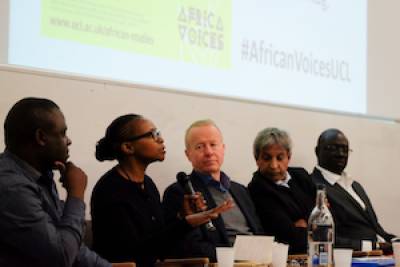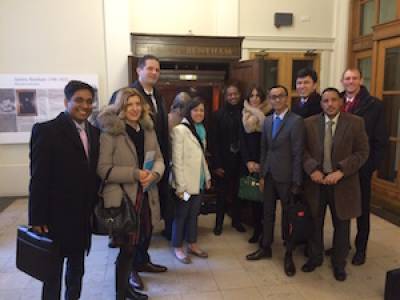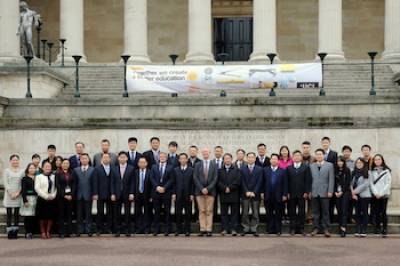Vice-Provost's View - laying the foundations for effective global engagement
25 February 2016
It is just over three months since I last gave an update on what's happening with our new Global Engagement Strategy (GES).

Here are some snapshots of what we've done since then. Some of it involves international travel (outbound and inbound); lots of it involves colleagues around UCL and external partners in London; all of it involves team building. There has also been a lot of working out what the new Global Engagement Office (GEO) can do to help you, and how. I've included some ideas on how you can get globally engaged, and what to look out for next in terms of UCL's global activity.
Collaborating with key partners: in China
In October, the Week@UCL covered China through President Xi's State Visit to the UK. UCL President & Provost, Professor Michael Arthur hosted Peking University (PKU), one of our potential anchor partners, in the margins of that visit. UCL has since won Erasmus+ funding for staff and student exchanges with PKU between February 2016 and May 2017. Other China-related engagement has included UCL Bartlett's hosting of a training course for senior Chinese urban planners in November and a visit to UCL by the President of Hong Kong University this month.
In Mexico and Chile
With two of UCL's new vice-deans international, the GEO visited Mexico and Chile at the end of November in order to sign a staff exchange agreement between 12 UK and 12 Mexican universities, to strengthen our relationship with Santander Universities Mexico and to follow up visits to UCL by the Chilean Ministers for Finance (in September) and Mining (in October). Minister of Mining Aurora Williams asked UCL (specifically Dr Stephen Edwards of the UCL Institute for Risk & Disaster Reduction) to join a new government/Embassy/UCL/industry working group to develop solutions to mining 'tailings' (the residue after extraction).
Since that visit, Professor Chris Rapley (UCL Earth Sciences) has represented UCL at Chile's 'congress of the future' in January, where he attracted warm praise from the British Ambassador in Santiago, a UCL alumna.
Mexico and Chile were identified as two of our four priority countries in Latin America in a paper for UCL Council last October, so these collaborations all show how we are aligning our activities strategically.
In Africa: Wellcome Trust Africa Centre bid and Africa Voices
In January, UCL submitted the Strategic Award application bid to become the UK host university for the Wellcome Trust Africa Centre, which if successful, would explore a possible merger with the world class laboratories of K-RITH (the KwaZuluNatal Research Institute for TB and HIV), founded by the Howard Hughes Medical Institute.
To oversee the bid, UCL has established a steering group, co-chaired by Professor David Lomas, UCL Vice-Provost (Health) and me. It has met twice so far, and we have also set up a working group to help with due diligence and risk assessment. We are considering how this collaboration might develop into another one of our potential anchor partnerships - a very complex one, given the network of local, national, regional and international partners already involved. But there is a definite opportunity to multiply our local and global impact and to demonstrate UCL's global reach and distinctive ethos through this web of partners.

New UCL developments related to Africa were also on display during the successful launch of the African Studies Research Centre throughout an 'African Voices' fortnight in January, which included participants from Senegal, South Africa and Uganda.
In India and Qatar
We shall be making a cross-institutional scoping visit to India, overlapping with one organised by UCL Science, Technology, Engineering and Public Policy (STEaPP), just after Easter. Our new Pro-Vice-Provost for South Asia, Professor Marie Lall is leading the planning of a four-city programme, together with Lesley Hayman, Head of the Global Partnerships team in the GEO. The visit will help us identify options for engagement, to be considered further in consultation with faculties over the summer.
We also need to make sure that we are not turning our backs on existing partners. In January and February, meetings with the Qatar Foundation led to agreement on recommendations from the review of UCL Qatar, so the direction of travel for the final five years of our contract is now clear. I will be talking to our staff in Doha about this in early March.
In London

We haven't been idle at home either. We've increased our regular support for Cara (Council for At Risk Academics) which helps faculty and postgraduate students from countries in conflict to continue their careers and higher education. We also welcomed to UCL a group of young international leaders organised by the Foreign and Commonwealth Office.
I've mentioned some of the new vice-deans international and regional pro-vice-provosts (PVPs) above. They are part of two crucial networks of academics across UCL, organised both by faculty and by geographical region/country, who will help us to tell our story of global engagement and impact. You can find details of the eleven vice-deans international and seven regional pro-vice-provosts here.

The regional PVPs, with support from the GEO, re-launched our seven Regional Networks, communities of interest and knowledge in specific parts of the world. The Europe and Latin America networks met in October; the South Asia one in November; South East Asia in December; and Africa and the Middle East in February. The ones coming up later this term are:
· South East Asia 9 March
· South Asia 10 March
· Europe 18 March (tbc)
· inaugural North America meeting 18 March
· Latin America 22 March
· East Asia 22 March
Our Global Implementation Group, now with student participation (and also about to have an external member), met again in February. Other oversight groups have held or are shortly to hold their termly meetings: the Qatar Country Board in February; and the Australia, Yale and PKU steering groups all in March. These groups are designed to get more academic input into decisions and to ensure more visibility of progress and improved governance on the way to reporting to SMT and Council.
Building a new team
The Office for International Affairs (OfIA), set up to supervise our overseas campuses, closed at the end of October. We opened the new Global Engagement Office on 2 November with seven members of staff in place out of a total complement of 18 posts. We held 15 rounds of interviews between November and February to fill the remaining posts. Thank you to all colleagues who joined me and the GEO 'founder members' on the interview panels. New members of staff joined the team between December and February. We now only have two more posts to fill.
Ours is certainly a small central team (with a budget of about £2.5m, half of which is staff costs) to deliver such an ambitious GES. But we aren't going to do it on our own: we are betting the bank on doing so with the active engagement of all the vice-deans international and the regional PVPs, as well as members of the Regional Networks - to say nothing of members of SMT, faculty managers and heads of many professional services unit who are directly engaged in delivering diverse aspects of the GES, ranging from increasing student mobility to launching the new International Summer School for Undergraduates (ISSU) this summer.
How you can get globally engaged
I talked to a group of new heads of departments and institutes last week about the GES - you can view the set of slides I used here. The final one asked them to get globally engaged in five particular ways, which I'd like all UCL staff to consider:
• Get to know your faculty's vice-dean international and whichever of the regional PVPs are most relevant to your department's global collaborations
• Enlist your data manager's help in sharing your department's partnerships: help us communicate your department's global impact
• Encourage your department to consult the GEO for guidance on the approval process for global partnerships
• Ensure your department uses the right templates (see guidance below)
• Get your dean's sign off for all 'Type 2' partnerships.
Templates for partnerships and seed funding opportunities
The GEO has developed a set of templates to make it clearer how to get approval of new partnerships, in line with the governance framework for UCL's global partnerships agreed by UCL Council last October. The steps to follow are illustrated in our 'Decision Pathway' workflow diagram. For this and examples of commonly used templates, see the Staff Resources for Global Collaborations tab on the UCL Global website. As soon as you start thinking about a new partnership, or renewing an existing one, with an overseas institution, please contact the relevant geographical manager on the GEO website. They will help you fill in the templates.
I also told heads of department about the new global partnership development funds we will be introducing soon. The 'Sea' and 'Currents' funds will be small pots of 'seed' money to encourage alignment with the priorities in the Global Engagement Strategy, complementing existing UCL grant schemes. Look out for more guidance next month about how to access these.
What does all that add up to in terms of increased global impact so far? Let me be honest - probably not a great deal yet. Global partnership building is a long-term venture, and you need to get the foundations right. With a clear new strategy, a small new central team in place, good networks across UCL, better baseline data, a range of activities chosen to align with the GES, our geographical priorities and our new governance processes, we are building on the thousands of fundamental partnerships that you have around the world. We are getting a clearer idea of the extent and creative vitality of that foundation with every Regional Network meeting and every exchange with the vice-deans and pro-vice-provosts - thank you!
You can find more detail about GES-related activity on our website and by subscribing to our bimonthly newsletter, UCL Global News.
Dame Nicola Brewer (Vice-Provost, International) Comments? Please provide your thoughts on this form
Images, from top to bottom: A chain of extinct volcanoes and mountains taken from El Abra's mining camp © Miguel Vera León/Flickr; Africa Voices panel; FCO leaders visit UCL; Chinese urban planners visit the UCL Bartlett
 Close
Close

